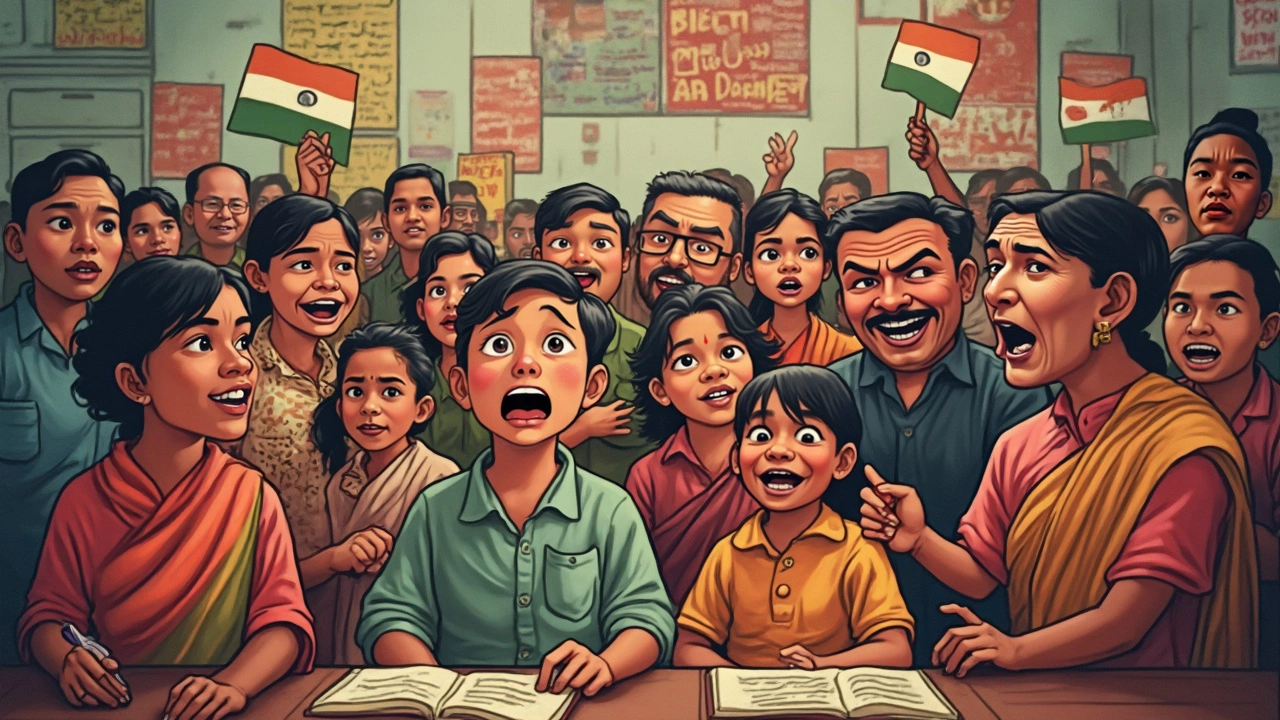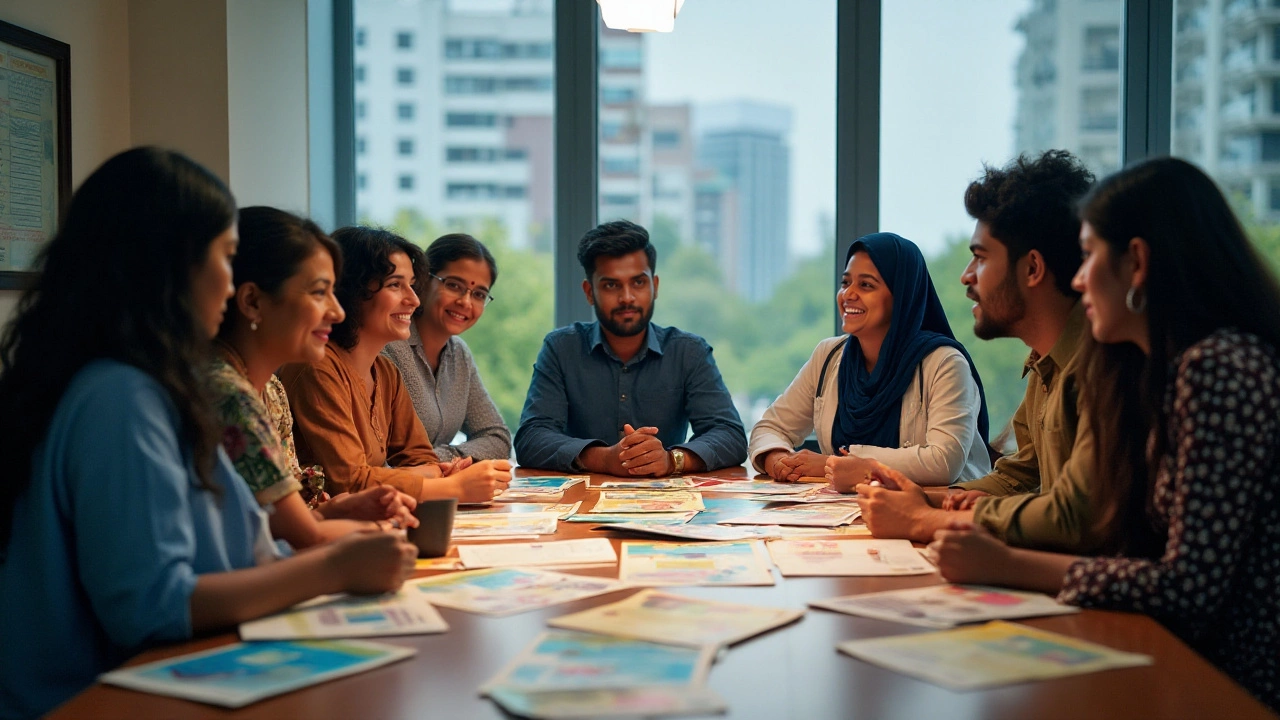Which States Oppose NEET in India? Breaking Down the Debate

NEET’s always in the headlines, and it’s not just because it’s tough. The real drama? Not every state in India wants it. If you’re from Tamil Nadu, West Bengal, Kerala, or a few others, chances are you’ve heard teachers, politicians, or even your own parents ranting about how NEET is unfair. What’s going on, and what should you know?
Let’s start with what matters most: your future. If you want to get into a medical college in India, NEET stands between you and that white coat. But here’s the twist—some states are fighting tooth and nail to keep NEET out because they think it messes with their own way of admitting students. And trust me, their reasons aren’t just politics—they’re about language barriers, inequality, and even old education systems that don’t match up with NEET’s pattern.
If you’re confused about whether you should join a NEET coaching class or focus on your state syllabus, you’re not alone. This split has made life tricky for thousands of students who feel caught in the middle. Let’s sort through this maze so you can plan smarter.
- What is NEET and Why is It Controversial?
- States That Officially Oppose NEET
- Why Are These States Against NEET?
- Impact on Students and Coaching Centers
- What’s Happening in Courts and Politics?
- Tips for Students in States Opposing NEET
What is NEET and Why is It Controversial?
If you want to get into a medical or dental college in India after class 12, you need to crack NEET. NEET stands for National Eligibility cum Entrance Test. Since 2016, it’s become the go-to exam for all aspiring doctors and dentists across India. Before NEET came along, states ran their own entrance tests, and some private colleges had their own too. But the government wanted a single, uniform test so everyone has a fair shot, no matter where they’re from.
Sounds simple, right? But it’s not, and here’s why. Rolling out NEET meant axing local entrance exams. Suddenly, everyone had to sit the same paper, in the same format, mostly in English or Hindi. For students who studied under state boards—especially in Tamil Nadu or West Bengal—it felt like moving the goalposts. Their textbooks and teaching styles often don’t match up with what NEET tests.
Here’s the key reason NEET is controversial: It’s seen as giving an unfair advantage to CBSE students and those with more access to good coaching. If you grew up in a village, or if your school focused on a state syllabus, you might feel lost. The controversy heats up around two main points:
- Language barriers: The exam is mostly in English and Hindi, even though millions study in state languages.
- Big city vs small town: Students in urban areas grab seats at big coaching centers, while rural students struggle with fewer resources.
Check out how NEET changed the scene:
| Year NEET Made Compulsory | No. of States Opposing in First Year | Languages Offered | Applicants (in lakhs) |
|---|---|---|---|
| 2016 | 7 | 2 (English, Hindi) | 8.0 |
| 2024 | 4 (actively vocal) | 13 (including Tamil, Bengali, etc.) | 24.1 |
Parents and students in at least four states keep pushing back, saying NEET doesn’t level the field but just favors those who have already got more. That’s why the protests keep popping up nearly every year. If you’re stuck wondering if your board syllabus is enough, you’re definitely not the only one.
States That Officially Oppose NEET
You hear it tossed around everywhere—some states flat out don't want NEET. But which ones? The most vocal is Tamil Nadu. They’ve been leading the charge, and it’s not just politicians making noise. Legal cases, student protests, and government committee reports all back their point: NEET doesn’t fit well with their schooling system or language needs.
West Bengal has also voiced strong opposition. In 2022, the West Bengal Chief Minister said NEET puts students from state boards and poorer backgrounds at a disadvantage because the test leans too much on CBSE standards and English. Kerala’s not as aggressive as Tamil Nadu or Bengal, but year after year, their leaders have asked for more flexibility, arguing NEET ignores the state’s unique education setup.
Sometimes, new states pop up in this debate—like Maharashtra and Andhra Pradesh. These states have raised concerns mostly about rural students struggling with NEET’s pattern. But their stance isn’t as steady or loud as Tamil Nadu’s.
Here’s what’s going on in 2025:
- NEET is being officially opposed by Tamil Nadu, West Bengal, and to a lesser extent, Kerala.
- Sometimes, Chhattisgarh and Telangana also raise objections, but they don’t have official anti-NEET policies all the time.
- States like Maharashtra file petitions but keep prepping students for NEET just in case it stays.
If you want the cold, hard facts, check out this table on state stances and actions:
| State | Stance on NEET | Recent Actions |
|---|---|---|
| Tamil Nadu | Strongly Opposed | Filed bills in State Assembly, court cases, released reports showing impact on rural/poor students |
| West Bengal | Opposed | Official statements by Chief Minister, demand for state-level exams, protests |
| Kerala | Critical | Formal letters to Centre, asking to tweak NEET or hold state quota exams |
| Maharashtra | Mixed | Filed petitions, but coaching for NEET continues |
| Chhattisgarh, Telangana | On and Off | Join other states in petitions sometimes, not a regular stance |
If you’re from one of these states, keep an eye on what your local government is saying each year. These positions shift suddenly, depending on court orders or political changes.
Why Are These States Against NEET?
When state governments like Tamil Nadu and West Bengal push back against NEET, they're not just complaining for the sake of it. There's real frustration bubbling under the surface, and it all comes down to two things: fairness and local reality.
First, the language problem hits home hard. NEET is mostly based on the CBSE syllabus and until recently, was mostly in Hindi and English. A huge chunk of students in places like Tamil Nadu, where kids grow up learning in Tamil and study under the state board, suddenly find themselves scrambling to understand unfamiliar material. It’s like switching up the rules mid-game.
Second, these states worry about inequality. Rural students and those from the state board feel they’re at a disadvantage. According to a 2022 Tamil Nadu government panel, over 80% of students who cleared NEET there came from urban or private school backgrounds—only a small slice were from government schools. That’s not just a trend, it’s a warning sign.
Here’s a quick look at what’s driving the resistance:
- Language Barriers: State board syllabi and languages don’t line up with NEET.
- Inequality: Urban, wealthier students benefit from easier access to coaching centers and CBSE prep.
- Loss of State Autonomy: States want their own say in who gets admitted to medical colleges.
- Fear of Brain Drain: When the system shifts to NEET, some local students may simply give up on medicine altogether, feeling like the deck is stacked against them.
- Coaching Center Pressure: In states with less coaching infrastructure, students and families feel more stress and financial burden.
Check out these numbers from Tamil Nadu for 2023:
| Background | Percent of Students Clearing NEET |
|---|---|
| Urban/Private School | 81% |
| Rural/Govt School | 19% |
With stats like that, it’s easy to see why so many students, parents, and even teachers in certain states believe the odds aren’t fair. Their opposition isn’t just noise—it’s about fighting for a level playing field.

Impact on Students and Coaching Centers
If you’re in a state that isn’t keen on NEET, life gets a bit more complicated. Students have to juggle their own state board patterns with NEET’s all-India syllabus, which is heavily based on the CBSE curriculum. This double prep can feel like a real headache—just ask anyone from Tamil Nadu, where reports found that students faced up to a 30% gap between their state books and NEET’s questions.
Many state board students discover too late that their textbooks aren’t enough. It’s why coaching centers have become almost a must-have. In cities like Chennai and Kolkata, the number of students joining NEET coaching jumped by over 40% after the national test became mandatory. But the catch is, NEET coaching isn’t cheap. Fees can go from ₹30,000 to ₹2 lakh for a year. Not everyone can afford that, so kids from rural or low-income families often feel left out.
Here’s how this NEET-state clash is hitting students and centers:
- Extra pressure: Students feel like they’re preparing for two different exams—state entrance and NEET—with different patterns and priorities.
- Language issues: NEET is mostly in English and Hindi, but many students studied science in their regional language. Translating questions sometimes leads to confusion and errors.
- Rise in coaching dependency: Regular school teaching often isn’t enough, so more families fork out serious money for private classes.
- Migration: Students from smaller towns move to metro cities for better coaching, sometimes living away from family for months or even years.
Some numbers make the picture clear:
| State | % Students Joining NEET Coaching (2024) | Average Coaching Fee (per year) |
|---|---|---|
| Tamil Nadu | 68% | ₹85,000 |
| West Bengal | 54% | ₹75,000 |
| Kerala | 80% | ₹90,000 |
The mental strain is real, too—stories about stress and burnout are everywhere during NEET season. For coaching centers, it’s a boom, but for families and students, it often feels like a relentless race. If you’re stuck in this situation, talking to NEET alumni from your own state can help, and focusing on the overlap between state board and NEET topics saves a lot of time.
What’s Happening in Courts and Politics?
NEET has kept lawyers, judges, and politicians on their toes for years. The story isn’t just about classrooms—it’s a courtroom drama and a political football, all at once. States like Tamil Nadu have taken their fight against NEET to the Supreme Court more than once. In fact, since NEET became the only medical entrance exam nationwide in 2017, legal tussles have popped up every year, especially after major national test results roll out.
In 2021, Tamil Nadu’s government passed a bill to scrap NEET and go back to their intermediate marks system. The state argued that rural and government school students lost out due to the NEET pattern, which they said favored urban and English-medium students. But when they sent the bill to the President for approval, things got stuck. The President has to give the green light before any state can opt out—and that hasn’t happened yet.
Kerala, meanwhile, has made a lot of noise in public and the state assembly but hasn’t pushed quite as far as Tamil Nadu legally. West Bengal and the North Eastern states have also spoken out, especially after seeing how their students scored compared to those from metro cities. Across the country, you’ll hear the word “federalism” thrown around—basically, states are arguing that the centre should respect their systems and local needs.
Check out the key events around NEET opposition in courts and politics:
- Tamil Nadu keeps trying to exempt its students from NEET. Every year, new petitions and proposals pop up.
- The Supreme Court has stressed several times that a nationwide exam ensures equal opportunity, but critics argue that’s not true in practice.
- Big protests break out in southern states after every NEET exam, with claims that students from state boards get left behind.
- No state has been allowed a full exemption yet—so every aspiring doctor in India still faces NEET for now.
And if you’re looking for numbers, this might surprise you:
| Year | Number of NEET-Related Cases Filed in Apex Courts | Major State Oppositions |
|---|---|---|
| 2017 | 26 | Tamil Nadu, West Bengal |
| 2018 | 32 | Tamil Nadu, Kerala |
| 2021 | 41 | Tamil Nadu |
| 2023 | 37 | Tamil Nadu, West Bengal, Assam |
Bottom line: NEET is still the NEET exam for all Indian medical aspirants. But the politics and court cases keep things shaky—so it’s smart to keep an eye on the news, especially if your state leaders are vocal about scrapping or changing the rules.
Tips for Students in States Opposing NEET
The reality is, even if your state government’s fighting NEET, you still need to prepare for it if you want a shot at medical college. Every year, thousands of students from places like Tamil Nadu, Kerala, and West Bengal clear the exam and land good colleges, even with local pushback. So, what’s the best move for you right now?
- NEET is still mandatory nationwide for all government and private medical colleges, no matter what state politicians promise. Even if legal fights are ongoing, don’t bank on policies changing overnight.
- Use state resources but don’t depend only on your state syllabus. NEET is based mostly on the NCERT curriculum from Classes 11 and 12. If you study only the Tamil Nadu or West Bengal board books, you’ll miss important topics.
- Consider joining an online or local NEET coaching center. Even in states opposing NEET, there are good local institutes and a ton of digital resources. Don’t just rely on school teachers (they may still focus on board exams).
- Practice mock tests in the NEET pattern—don’t just do state board papers. Sites like NTA (National Testing Agency) and even the NEET official website regularly post mock questions.
- Keep an eye on the news, but don’t get distracted by political debates. Focus on what’s actually being implemented—not just what’s being discussed in rallies and assembly halls.
Dr. V. Ravindranath, founder of the Doctor’s Association for Social Equality, said it best:
“No matter where you come from, students should be prepared for NEET until there is a final, legal decision. Don’t let confusion cost you a seat.”
Stay connected with classmates, use free learning apps, and talk to seniors from your own state who cracked NEET. They know exactly what it’s like juggling both board and national exam prep. Remember, adapting early makes life less stressful, especially if new rules drop last minute.


